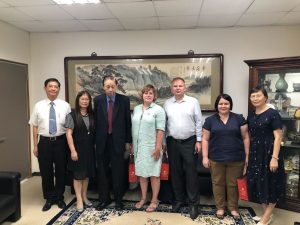Professor Vladimir Kurdyumov of the MCU’s Chinese Language Department gave an extensive online interview about Chinese language and culture, education, linguistics, and research to Associate Professor Kristina Kotcik. Professor Kurdyumov is one of the co-founders of the Chinese Language Faculty that was established in 2007 at MCU and later transformed into the Chinese Language Department. Currently, he is Chief of The Center for Russian-Chinese Cooperation at MCU.
In the course of the interview, professors discussed such questions as teaching and learning Chinese, education in linguistics, objectives of education, and the theory of language. Professor Kurdyumov talked about the past and present-day condition of education and research in Chinese Studies, and forecast probable changing in the future.
Professor Kurdyumov explained that one of the foremost objectives of higher education is developing the philosophic mindset and attitudes to life in young people. According to Professor, learning a foreign language is crucial to achieving this objective as it helps overcome prejudices and ethnocentrism. Professor Kurdyumov emphasized that higher education is not a field of services and that it only should assist students in self-learning and comprehension of the world.
The academiс work of the Chinese Language Department is focused on motivating and encouraging students who learn the Chinese language to study the country’s culture and history. Professor elaborated on the diversity of the Chinese world that comprises four basic branches: Continental China and Taiwan, Hong Kong, Macau, and Singapore. Each part has its own cultural, historical, and linguistic features, which should be explored when learning the language. Professor Kurdyumov underlined that the Beijing dialect is not the most spoken in China and elsewhere, though taught worldwide. This is the reason why Chinese language students should pay attention to other dialects.
Recently Professor Kurdyumov has become interested in the study of the Taiwanese variant of the Chinese language. He supports the idea that it is rather a separate language than a variant or dialect. The Taiwanese language features its own phonetic system, grammar, stylistics, and principles of text construction, which are noticeably different from the Chinese language.
Professor Kurdyumov mentioned that the approaches to the Chinese language study are different around the world. Native Chinese and Taiwanese scholars study the language from the point of view of Philology, which includes Literature and Literary Studies. In Europe, the language is viewed through the cultural aspects of the country. Russian researchers traditionally describe its grammar and stick to linguistic means.

Answering the question of Chinese grammar study, Professor Kurdyumov gave a piece of advice to resort to the textbooks of the past, e.g. A Grammar of Spoken Chinese by Yuen Ren Chao (1968), as older textbooks are much more comprehensive compared to the new ones. The same might be true for the research in Linguistics. Previously, scholars used to study greater linguistic problems, while current research covers only smaller components of the language and does not fully satisfy the needs of the scientific field. Speaking about the description of Chinese grammar, Professor criticized the Western approach, which studies the language through the prism of European languages. Recently, he was offered to write a textbook on Chinese grammar of his own. Professor Kurdyumov accepted the offer as he has got enough experience and expertise to compose a comprehensive tutorial.
Another question to Professor concerned the international cooperation at the Chinese Language Department since many students are interested in an opportunity to be trained by native speakers, and young researchers to get assistance in scientific work. MCU has partnership agreements with 21 Chinese and Taiwanese universities. 30 professors from China and Taiwan are employed by MCU. Professor admitted that before the Covid-19 pandemic the exchange between MCU and Chinese and Taiwanese universities was outstandingly active, and expressed hope that it will soon resume.

